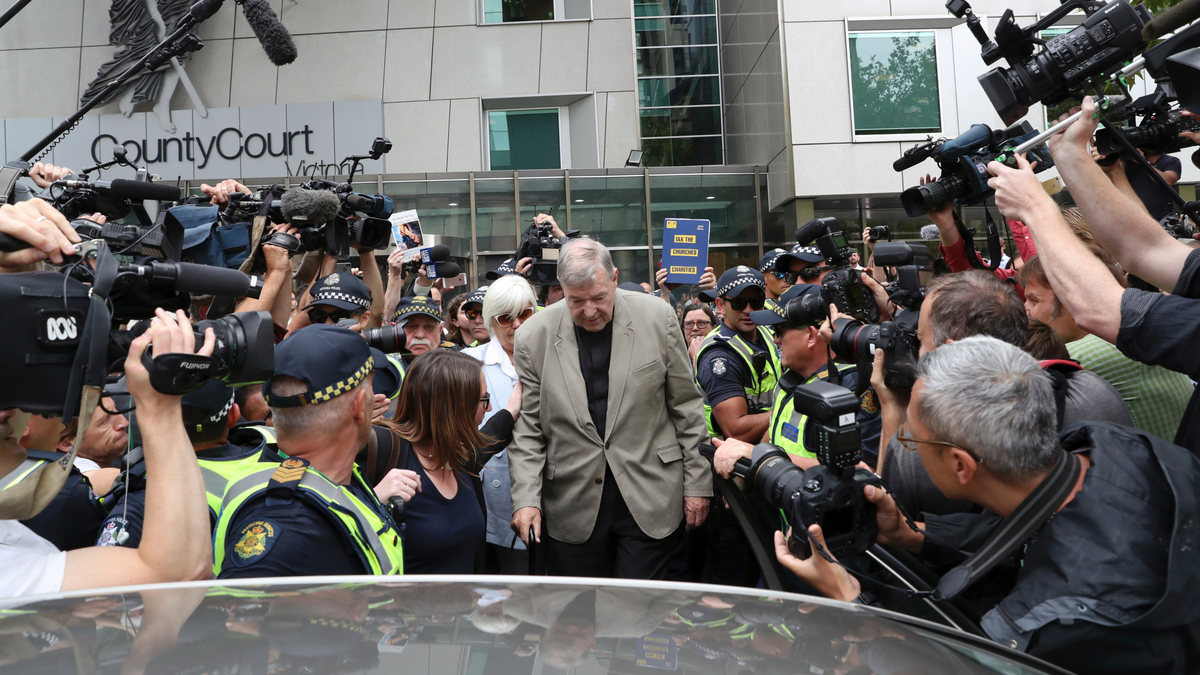
Cardinal George Pell, center, leaves the County Court in Melbourne, Australia, Tuesday, Feb. 26, 2019. The most senior Catholic cleric ever charged with child sex abuse has been convicted of molesting two choirboys moments after celebrating Mass, dealing a new blow to the Catholic hierarchy's credibility after a year of global revelations of abuse and cover-up. (David Crosling/AAP Image via AP)
VATICAN CITY – The Vatican on Tuesday described as "painful" the news of the conviction of Australian Cardinal George Pell, one of Pope Francis' top aides, by an Australian court for molesting two choirboys in the 1990s, but insisted the prelate has the right to defend himself until the appeals process is completed.
Acting Vatican spokesman Alessandro Gisotti on Tuesday read a brief statement but took no questions about the conviction, which was delivered unanimously in Victoria state County Court in December. Due to a strict court order, news of the verdict couldn't be published until Tuesday.
The pontiff "to guarantee the course of justice" has confirmed precautionary measures he already had taken against Pell, including banning him from publicly celebrating Mass, and "as is the rule, contact in any way and form with minors," Gisotti said.
Francis had tapped Pell as his economy minister in 2014 as part of Vatican determination to reform its scandal-plagued financial system, even though some allegations against the Australian were known at that time. Pell's conviction likely further stains Francis' record on cracking down on credibly abused clergy.
The court verdict represented "painful news that, we are well aware, has shocked very many people, not only in Australia," Gisotti said. "As we have affirmed on other occasions, we restate the utmost respect for Australian judiciary authorities," he said.
"In the name of this respect, we now await the outcome of the appeals trial, recalling that Cardinal Pell has reiterated his innocence and has the right to defend himself until the final level" of Australia's justice system, the spokesman said.
"While awaiting the definitive judgment, we unite ourselves to the Australian bishops in praying for all the victims of abuse, reiterating our commitment to do everything possible so that the church is a safe home for all, especially for children and the most vulnerable." Gisotti said.
Pope Francis has been accused by critics of casting doubt on some victims' allegations against high-profile clergy, including a notable case in Chile.
In 2016, during a flight back to Rome after a pilgrimage in Poland, Francis responded cautiously to a question posed by The Associated Press about how to properly handle the Pell case.
"One shouldn't judge before justice judges," Francis replied. "If I gave a judgment in favor or against Cardinal Pell, it wouldn't be good, because I'd be judging ahead" of civilian justice, likening that to "the judgment of gossip."
He added: "Pay attention to what justice will decide," concluding: "Once justice has spoken, I will speak."
